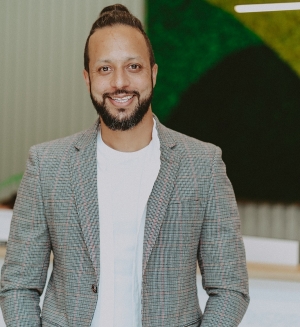As with so many innovation origin stories, the idea that inspired Amar Magon, BComm 05, to launch a new niche enterprise came in the form of an unmet need.
Seven years ago, Magon’s cousin, Jasdeep Saluja, an internal medicine specialist, shared how frustrated he’d become managing his patients’ health conditions solely with pharmacological solutions. When Saluja’s father, Magon’s uncle, was hit with both a stroke and heart attack, he lamented to Magon that he had nothing in his medical toolbox “to offer my Dad to make sure this doesn’t ever happen again.”
The cousins, both living in Victoria, B.C., decided to launch a business together, Aroga Lifestyle Medicine, along with internal medicine specialist Jesse Pewarchuk. Aroga offers online and in-person programs to help boost a patient’s health through the increasingly popular mind-body approach, addressing not just what they eat but how they exercise, sleep, practice mindfulness and control the substances they put into their body.
“Our health-care system is broken,” says Magon. “We are symptom-driven and just prescribe, prescribe, prescribe. So, when my cousin came to me with his complaints, I realized this would be a perfect business for me. He also shared with me the concept of lifestyle medicine because he knew there was a personal alignment for me and a match with my entrepreneurial background.
“After all, activity, exercise, mindfulness — all of these things were very much part of my upbringing, but also more importantly, it is part of daily life for me, my wife and our three girls.”
What began as a health-care clinic in British Columbia has extended its reach to Ontario and, very soon, Alberta, Magon says, who notes how Aroga has grown from 50 referrals from family physicians on day one to 40,000 today.
Patients are clamouring to be referred to Aroga, says Magon. “When a doctor advises you about your health, it’s different than when your cousin or your dad says something, and we have a roster of specialists and dieticians to work closely with patients.”
Business in the blood
Even before he chose to pursue a BComm at Concordia, the entrepreneurial spirit was part of Magon’s life. Growing up in Montreal, his father was an entrepreneur whose business focus ranged from real estate to restaurants. One of his brothers built his own professional singing and acting career, and the other brother developed a large real-estate development company.
“Entrepreneurship came naturally to me because it was all around me,” he recalls.
During his years at Concordia, engaged in the Co-op program at the John Molson School of Business, he launched his own company in the final term, when most students were trying to work at established firms.
Magon started a business converting the placemats at fast-food restaurants into sellable advertising space. “The business had legs, but I eventually closed it down,” says Magon, who began eyeing consultancy work soon after graduation.
His approach to his career path has harnessed the same level of creativity, whether working for himself or someone else. When he spotted a job opening at Accenture for a global SAP BW (data warehousing) consultant, he took action immediately, calling Accenture’s main line and asking to be put in touch with the HR department.
“I knew this was a great way to get proper corporate experience by working with one of the largest consulting companies in the world,” he says.
A week after speaking with an HR representative, Magon secured an interview and, after the fifth interview, he was offered the position. Magon says, “I was just doing what I thought I had to do to give it my best shot. And it worked.”
That resourceful approach also applies to managing the many moving parts of Aroga and adapting to change. During the COVID-19 pandemic, virtual consultations took off and have been a core part of the business ever since.
Magon notes that it’s not just patients embracing lifestyle medicine and seeking Aroga’s programs. Physicians, too, are growing increasingly frustrated by a health-care system that doesn’t empower patients to prevent and reverse illness.
“Doctors are discovering lifestyle medicine and they are actually bringing it into their own lives first,” says Magon. “Once they do, they say, ‘I could do this for all my patients! Why the heck didn’t I ever think about this? And why didn’t anybody ever teach me about this in the first place?’ It’s a revelation.”
 “Entrepreneurship came naturally to me because it was all around me,” says Amar Magon, BComm 05.
“Entrepreneurship came naturally to me because it was all around me,” says Amar Magon, BComm 05.